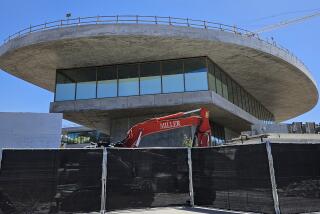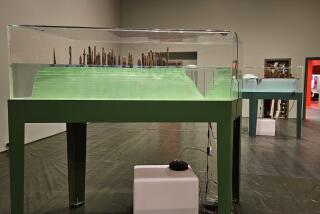MOCA’s ‘A New Sculpturalism’ faces uncertain future without Gehry
Frank Gehry has pulled out of a major architecture exhibition set to open June 2 at the Museum of Contemporary Art, a move that could force the show to find a new venue or face the prospect of being canceled altogether.
The exhibition, “A New Sculpturalism: Contemporary Architecture From Southern California,” is an exploration of the last 25 years of Los Angeles architecture, with work by Gehry, Thom Mayne, Michael Maltzan, Barbara Bestor, Lorcan O’Herlihy and many younger architects. It is a major component of the Getty-sponsored series Pacific Standard Time Presents: Modern Architecture in L.A.
Organized by guest curator Christopher Mount, it was to run through Sept. 2 at MOCA’s Geffen Contemporary venue in Little Tokyo. It was funded in part by a Getty Foundation grant of $445,000.
No other single show in the PSTP series received a grant as large, according to a Getty press release. A 272-page catalog, co-published by Rizzoli, is already complete.
“I am fearful it’s going to be canceled,” Mount said by phone.
Gehry was not just the central focus of the show, but its pivotal figure. Once he made it clear he would not participate, MOCA was left to re-conceive the entire show on the fly.
Mount, former executive director of the Pasadena Museum of California Art and before that a curator in the architecture and design department at the Museum of Modern Art in New York, added that if the show were to survive, it will be difficult if not impossible to finish installing it this month. At the very least, he said, “It’s going to have to be delayed.”
CHEAT SHEET: Spring Arts Preview
“I think that the last 25 years of architecture in L.A. has been a remarkable period, and I think a major institution should be supporting this exhibition,” Mount said. “What I would like to see is a community uprising, so to speak, where these 34 firms stand up and say, ‘You can’t cancel a show that’s four weeks away.’”
Calls and emails to MOCA officials were not returned.
As the show took shape over the last several months, several architects, including Gehry, began to have serious concerns about the direction in which Mount was taking it and how he was planning to position and explain their work.
Gehry withdrew from the exhibition last month, despite what he described as entreaties from Mount, MOCA Director Jeffrey Deitch and top officials from the Getty.
“I didn’t feel comfortable in it,” Gehry said. “It didn’t seem to be a scholarly, well-organized show.”
He added: “I’m subject to misunderstanding about the seriousness of my work. People assume I am just crumpling paper and so forth. This was feeling a bit that way, a trivialization.”
PHOTOS: Arts and culture in pictures by The Times
Linking the work of Gehry, Mayne and Eric Owen Moss with that of younger L.A. architects and wrapping it all under the rubric of “sculpturalism” was certainly going to require curatorial gymnastics, even sleight of hand.
Much of Maltzan’s architecture, to pick just one example, is significant precisely to the degree that it moves away from highly sculptural form-making to engage issues including housing policy and L.A.’s rising density.
Mount took issue with the suggestion that the uncertainty surrounding the show had to do with its curatorial approach. He insisted it had more to do with questions about the ultimate size of the exhibition and its budget, which he said was $614,000.
“The problem is purely financial ... not because Frank doesn’t want to be in a group show,” he wrote in an email Thursday. “All these Getty shows go through rigorous academic scrutiny.”
ART: Can you guess the high price?
Some of the participating architects are eager to see the show in some form mounted elsewhere.
Gallerist Douglas Chrismas said he had held preliminary talks with some of them about installing it — still without Gehry’s participation — this year at his Ace Museum on La Brea Avenue.
“If the show was canceled or was not in the cards for them I would love to have the exhibition at Ace and give it, along with the curator, major attention.”
“I’m waiting to hear back” from Deitch, Chrismas said. “I don’t want there to be any awkwardness for him.”
He added, “Whatever’s going to happen, it has to happen really fast. The show might even move over here under MOCA’s flag.”
In his foreword to the catalog, Deitch writes that the exhibition’s goal was to chart the “important Los Angeles architecture of the past twenty-five years, identifying key firms and practitioners whose works have not only distinguished this city as a locus for experimentation but have also influenced design internationally.”
Deborah Marrow, director of the Getty Foundation, declined to speak directly about the status of “A New Sculpturalism,” referring questions to MOCA.
Asked in general terms how the foundation responds when a project it has funded is canceled or significantly altered, she replied: “In the realm of speculation, any time — and it is very rare — any time a grantee’s project doesn’t happen, we have procedures we follow. It rarely happens but it does occasionally. And we deal with it.”
More to Read
The biggest entertainment stories
Get our big stories about Hollywood, film, television, music, arts, culture and more right in your inbox as soon as they publish.
You may occasionally receive promotional content from the Los Angeles Times.











